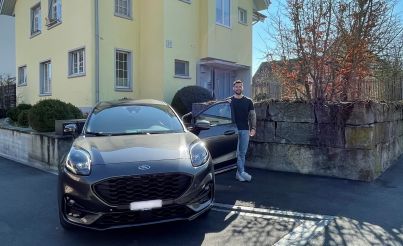- Note - Disclaimer for information
- How are company cars used in Switzerland?
- Private use of company cars - what options are available?
- When is a company car used for private or business purposes and what are the tax implications in Switzerland?
- How can the private share of a company car be calculated in Switzerland??
- Are there special forms for calculating the private share on company cars in Switzerland?
- Where should the employee's private use of the company car be recorded?
- Buying, leasing or subscribing a company car - does it make a difference from a tax perspective?
- Benefits of the car subscription for business customers at a glance
- Disclaimer - Exclusion of liability
Whether a single vehicle or an entire company fleet, company cars are an integral part of our corporate world. However, company cars are used differently by employees depending on their business purpose. They are often also used for private purposes. This has tax and administrative implications for both the company and the employee. In this blog you will find out the most important facts about the taxation of company cars in Switzerland and whether a car subscription for business customers is an attractive alternative to buying or leasing.
Note - Disclaimer for information
We ask for your understanding that the information provided by us does not claim to be complete and/or correct and is no substitute for tax advice. A trustee or tax advisor can advise you in the best possible way with regard to your personal tax situation and the applicable - different - cantonal provisions.
How are company cars used in Switzerland?
A company car can either be assigned to a permanent employee or used as a so-called "pool car". If a company car is allocated to an employee, he or she is usually allowed to use the car for private purposes in addition to commuting to work. This is either billed according to the number of kilometres driven or a monthly flat rate set by the federal government. Both options have tax implications, which are explained in more detail in the article.
So-called pool vehicles, on the other hand, are driven by different employees and are intended for business use only. As the employer, you bear the full cost of the vehicle, which you can and must claim for tax purposes.
Private use of company cars - what options are available?
The private use of a company car is one of an employer's fringe benefits. Offering private use is certainly a welcome benefit for employees. However, for you as an employer in Switzerland, the provision of a company car involves a considerable amount of additional work, particularly with regard to taxation.
The type of taxation depends on the form in which the vehicle is provided. There are various ways of using the vehicle and therefore of accounting for it:
The company car may be used exclusively for business purposes.
The company car can also be used privately, but the employee must keep a logbook of business and private kilometres..
Private use of the car is charged at a flat rate.
When is a company car used for private or business purposes and what are the tax implications in Switzerland?
If the employee is contractually allowed to use the car only for commuting to and from work and for business trips, the private portion does not apply. However, the "F" box on the salary statement must be ticked.
If the employee uses the car for purposes other than commuting to and from work, a private share must be calculated. This is always shown on the salary statement. This means that the non-cash benefit from the provision of a company car, which may also be used privately, counts as taxable remuneration in kind, which is subject to AHV.
How can the private share of a company car be calculated in Switzerland??
There are two ways of calculating the private share - both on the salary statement and on the payslip - that have been approved by the federal government.
Option 1: Flat-rate taxation
Flat-rate taxation of company cars is generally applied if the employer bears all the costs for the company car. In addition to the vehicle itself, this also includes the cost of insurance, service and maintenance, tyre changes, repairs, cantonal redemption and the vignette. The company also generally pays for the fuel/recharging of the company car, as long as the car is not used for purely private purposes.
The flat-rate taxation is regulated as follows: Private use of the company car (including commuting costs) is taxed at 0.9% of the vehicle purchase price per month (as of 06/2024).
The purchase price is the price actually paid, excluding VAT; in the case of a leased vehicle, it is the cash purchase price stated in the contract, also excluding VAT. The monthly value must also be at least CHF 150. With the new regulation for the private use of company cars at the beginning of 2022, the effective offsetting of travel costs between home and work as income has also been abolished (from 06/2024).
Example calculation:
CHF 50,000 (purchase price) times 0.9 % (flat rate) equals a monthly private share of CHF 450. The total amount shown on the salary statement under point 2.2. is therefore CHF 5,400 (12x450), which is subject to AHV contributions.
Option 2: The logbook
With effective accounting, the employee only pays for the kilometres driven privately and is therefore required to keep a logbook throughout the year. This model is most suitable when the employee is responsible for the total cost of the car. The cost per kilometre is based on the kilometre rate in the table provided by the Touring Club Switzerland (TCS). This is currently CHF 0.70.
The kilometres driven in the previous year are used as the basis for calculating the totals for the monthly payslip and the annual salary statement. This is therefore a provisional private share, which is adjusted at the end of each year according to the actual number of kilometres driven. The repayment or additional payment is made in December of the corresponding year.
Example calculation:
Kilometres driven in the previous year: 9,132 km. TCS kilometre rate: CHF 0.70. The private contribution is therefore CHF 6,392.40 per year or CHF 532.70 per month. This amount is also subject to AHV contributions.
Are there special forms for calculating the private share on company cars in Switzerland?
Yes, if the employee pays the full cost of the car. In other words, the employee also pays for maintenance, repairs and insurance. In this case, it must be noted in item 15 of the salary statement that the private share of the company car will be clarified in the assessment procedure. However, as the tax authorities have to request all the details from the company again for each procedure, this is time-consuming and resource-intensive and is therefore rather not recommended.
Where should the employee's private use of the company car be recorded?
In addition to calculating the private share, it is important for the employer to record the private use of the company car on the employee's salary statement and payslip. The corresponding amount can be found under point 2.2 of the annual salary statement. The "F" box on the salary statement must also be ticked. This indicates that the employer pays for the employee's travel to work. As a result, the employee can no longer make any deductions for travel to work in his or her personal tax return.
Buying, leasing or subscribing a company car - does it make a difference from a tax perspective?
From a purely tax point of view, in all cases capital is tied up. However, leasing and, in particular, car subscriptions increase the liquidity of a Swiss company since, unlike a purchase, the entire price does not have to be paid in advance. In addition, the individual instalments for leasing and car subscriptions can be claimed as expenses for tax purposes. Buying a car, on the other hand, involves depreciation.
Benefits of the car subscription for business customers at a glance
In addition to the tax benefits, the car subscription offers a number of other advantages for business customers in Switzerland:
Flexibility: As a company, you remain flexible with monthly adjustable KM packages and can always adapt the number of kilometres to your current needs.
Term (3 months - 4 years): The car subscription is ideal for seasonal employees, short-term projects or employees on probation. But it is also an attractive long-term solution for sales representatives or long-term employees.
Low administration & cost transparency: Thanks to the All-in-One subscription, the administrative burden on your company is low, as the monthly price includes insurance, taxes, registration, service and maintenance as well as tyres, in addition to the company car. This saves valuable working time as you don't have to worry about these matters. Plus, a single instalment makes budgeting transparent and easy.
Fast availability: With a car subscription you benefit from the fact that your vehicle can be at your company or employee's premises within 14 days if it is available from stock. This is ideal if there is a seasonal spike in demand or you need a vehicle to bridge the gap.
The car subscription therefore not only offers a tax advantage over a purchase, but also practical and financial incentives that are particularly attractive to business customers like Luca from L&R. If you and your Swiss company are interested in a car subscription, you are welcome to take a look at Carvolution's vehicle selection. Our team will also be happy to provide a non-binding consultation for business customers.
Disclaimer - Exclusion of liability
All texts and links have been carefully checked and are constantly updated. We endeavour to provide correct and complete information on this website, but accept no responsibility, guarantee or liability whatsoever that the information provided on this website is correct, complete or up-to-date. We reserve the right to change the information on this website at any time and without prior notice and do not undertake to update the information contained herein. All links to external providers were checked for accuracy at the time of their inclusion, but we are not liable for the content and availability of websites that can be accessed via hyperlinks. Liability for illegal, incorrect or incomplete content and in particular for damage caused by the content of linked pages lies solely with the provider of the linked page. It is irrelevant whether the damage is of a direct, indirect or financial nature or whether there is any other damage that could result from loss of data, loss of use or other reasons of any kind.
Sale
Benefit from attractive discounts on selected vehicles. Everything is included in the subscription, and a buyout is possible at the end!










